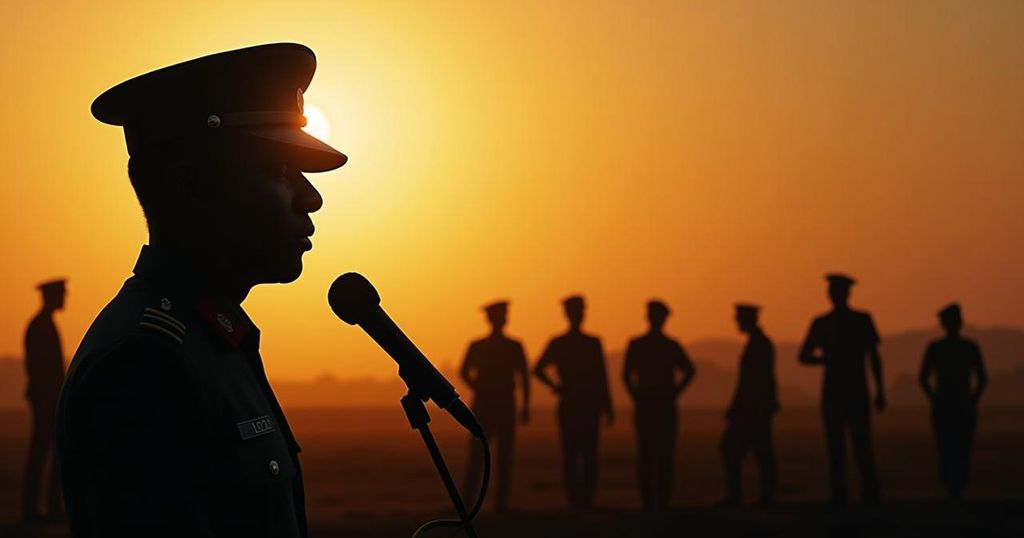Sudan’s Army Chief Critiques Middle Eastern Influence Amid Ongoing Conflict

General Abdel Fattah al-Burhan, the Sudanese army chief, criticized regional actors, implicitly targeting the UAE, for supporting the paramilitary Rapid Support Forces in a speech to the UN. As the Sudanese Armed Forces launch a major offensive to reclaim Khartoum, Burhan pointed to external funding as a key factor prolonging the conflict. Despite claims of humanitarian crises exacerbated by RSF actions, Burhan downplayed the severity of the situation. The ongoing war has displaced millions and prompted urgent calls for international aid.
In a pointed address delivered to the UN General Assembly, General Abdel Fattah al-Burhan, the chief of the Sudanese Army, voiced criticism of unidentified regional actors, implicitly referring to the United Arab Emirates (UAE) for allegedly supporting the paramilitary Rapid Support Forces (RSF). As the Sudanese Armed Forces (SAF) ramped up a significant offensive to assert control over Khartoum, General Burhan remarked that the RSF had been the beneficiary of both political and logistical backing from foreign states—actions he identified as efforts to exploit Sudan’s natural wealth through force and monetary influence. Reports from Middle East Eye have documented the UAE’s connections with the RSF, whose leader, Mohamed Hamdan Dagalo, was formerly associated with the Janjaweed militias. During a subsequent press briefing, General Burhan mentioned a previous discussion with UAE ruler Mohammed bin Zayed, wherein the latter allegedly stated a willingness to reevaluate the situation in Sudan. This exchange, however, lacked substantiated details. Burhan characterized the support manifested by certain regional nations as “most unfortunate,” contending that this foreign intervention has prolonged the conflict. He reiterated the Sudanese army’s assertions made to the UN, providing evidence of the UAE’s involvement, which allegedly includes the presence of Emirati troops within Sudan’s borders. Despite these claims, the UAE has consistently denied supporting the RSF. In the context of the ongoing war, which has escalated since April of the previous year, the Sudanese Armed Forces recently structured a substantial offensive against RSF strongholds in Khartoum, capturing vital infrastructure including two bridges. Nevertheless, conflicting reports emerged, with RSF claiming they successfully resisted the army’s advance. Eyewitness accounts indicated that military actions continued, including aerial bombings targeting oil refineries critical to Khartoum’s operations. The humanitarian situation remains dire, particularly in el-Fasher, North Darfur, where aid workers warn of potential mass starvation caused by RSF blockades. Burhan, when confronted about the crisis, minimized the severity of the food situation by downplaying it as a mere “food gap” rather than famine. He further accused the RSF of heinous acts including ethnic cleansing and actions warranting classification as terrorism, thus shifting accountability for the conflict’s horrendous impacts onto the paramilitary group. Despite hopes for diplomatic developments, Burhan reiterated his reluctance to engage in any discussions with Hemeti, the RSF commander, unless specific conditions are met. The prolonged conflict has displaced vast numbers of individuals and resulted in widespread fatalities, with humanitarian organizations urgently calling for assistance amid escalating violence and disease outbreaks across Sudan.
The conflict in Sudan originated from tensions between the Sudanese Armed Forces and the Rapid Support Forces, both of which have political and military aspirations in the region. The RSF, which evolved from the Janjaweed militias notorious for their role in the Darfur conflict, has received significant allegations of external support. The involvement of regional players, notably the UAE, has led to accusations that this support aggravates the situation, complicating the existing humanitarian crisis. The political landscape in Sudan has been marked by a struggle for power among these factions, further igniting internal conflicts and drawing international concern over human rights violations and the stability of the region.
In summary, General Abdel Fattah al-Burhan’s address at the UN raises critical concerns regarding external influences on the ongoing conflict in Sudan, highlighting the controversial role of the UAE in supporting paramilitary forces. As the Sudanese Armed Forces engage in a renewed offensive and assert the RSF’s involvement in widespread atrocities, the humanitarian crisis continues to deteriorate. The prospects for peace remain uncertain, with entrenched positions on both sides underscoring the complexity of achieving a resolution in this protracted conflict.
Original Source: www.middleeasteye.net








